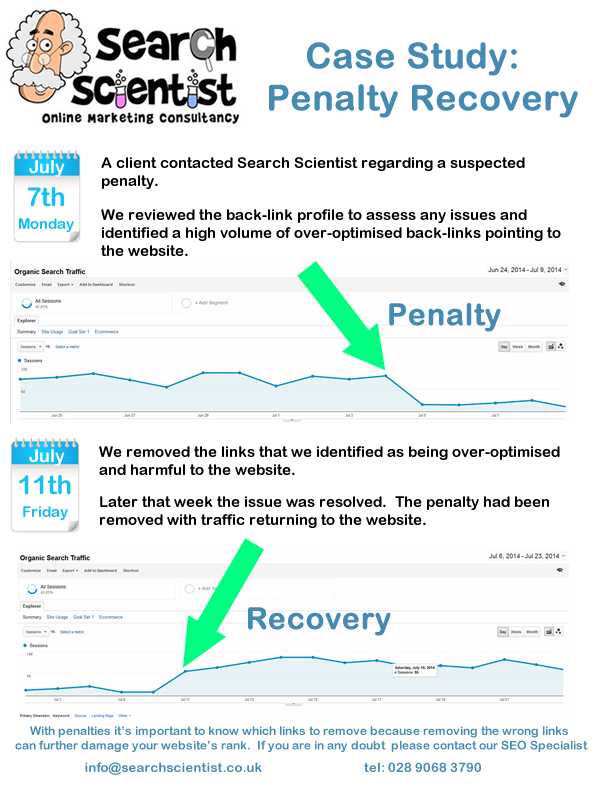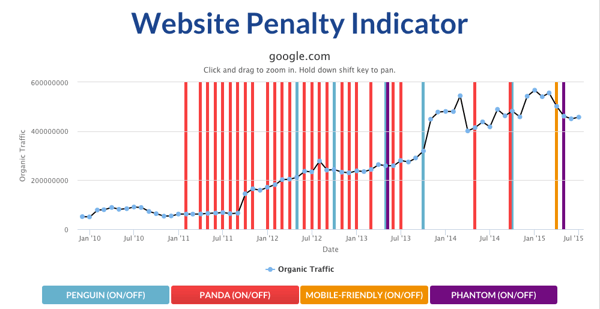Find out how a simple mistake can lead to a dreaded Google penalty, jeopardizing your website’s rankings and traffic.

Image courtesy of via DALL-E 3
Table of Contents
Introduction to Google Penalty
Imagine you’re playing your favorite sport, but instead of following the rules, you decide to do things your own way. Just like how you might get a penalty for not playing fair in a game, websites can also get “Google penalties” for not following the rules set by the search engine.
What is a Google Penalty?
When a website doesn’t follow Google’s rules, it gets a penalty. This penalty makes it harder for people to find the website when they search on Google. It’s like when a player in a game doesn’t play by the rules and gets penalized.
Why Does Google Give Penalties?
Google acts like the referee of the internet, making sure that everyone plays fair. Just like how referees ensure fairness in a game, Google gives penalties to websites that try to cheat the system. By enforcing these penalties, Google helps maintain a level playing field for all websites on the internet.
How Google Search Works
Have you ever wondered how Google finds the best websites when you search for something online? It’s like looking for a special book at the library. Let’s explore how Google search works!
Google’s Ranking System
When you search for something on Google, it goes through millions of websites to find the most helpful ones. Just like how you would want the best book on dinosaurs if you’re doing a school project on them, Google wants to show you the most relevant websites for your search. It ranks websites based on an algorithm, which is like a special recipe that considers things like how many other websites link to a site and how well the content matches your search.
The Importance of Following Rules
Imagine if everyone played sports without following the rules, chaos would ensue. Similarly, Google sets rules for websites to follow to ensure fair play on the internet. Websites that follow these rules are more likely to show up on the first page of search results, making it easier for you to find what you’re looking for. Just like how playing by the rules in a game earns you respect, following Google’s rules helps websites earn a good ranking.
Types of Google Penalties
Manual penalties are given by real people from Google who check websites to see if they are following the rules. It’s like a teacher catching a student breaking the school’s rules and giving them a timeout. These penalties are specific to certain websites and are usually given for serious violations.

Image courtesy of www.searchscientist.co.uk via Google Images
Algorithmic Penalties
Algorithmic penalties are like automatic punishments given out by Google’s computer programs. Imagine a robot referee watching a game and blowing the whistle when it sees a player cheating. These penalties are more general and can affect many websites at once if they’re not playing fair.
Remember, whether they’re manual or algorithmic, Google penalties are meant to encourage websites to play by the rules and provide the best experience for users.
Common Reasons for Google Penalties
When a website doesn’t follow the rules set by Google, it can face what is known as a Google penalty. Just like in sports, where players can get penalties for breaking the rules, websites can also get penalized for not following the guidelines set by the search engine giant.
Keyword Stuffing
One common reason for Google penalties is keyword stuffing. This happens when a website uses the same word too many times unnaturally in an attempt to manipulate search engine rankings. It’s like writing an essay and repeating the same word over and over again, making it seem forced and unnatural.
Spammy Links
Having too many links from low-quality or spammy websites can also lead to Google penalties. Think of it as having friends who always get into trouble. Just like hanging out with the wrong crowd can reflect poorly on you, having links from questionable websites can harm your site’s reputation.
Poor Content
Low-quality content is another common reason websites receive penalties from Google. Imagine writing a book report that doesn’t make any sense or help the reader understand the book. Google wants to provide users with helpful and valuable content, so websites with poor-quality content may be penalized.
How to Check for a Google Penalty
Google Search Console is like a report card for websites. Just like how you can check your grades in different subjects, website owners can use Google Search Console to see if Google has given them any penalties. By logging into this tool, website owners can get a clear picture of how their website is performing in Google’s eyes.

Image courtesy of blog.hubspot.com via Google Images
Watching for Traffic Drops
Imagine you’re at a party, and suddenly, some of your friends stop talking to you. That might be a sign that something is wrong. Similarly, if a website notices a sudden drop in the number of people visiting their site, it could be a signal that Google has penalized them. Keeping an eye on the website’s traffic regularly can help catch these drops early and take action to address any issues causing the penalty.
Recovering from a Google Penalty
So, your website has been given a Google penalty. Don’t worry; there are ways to fix it! One common reason for penalties is having bad links on your site. It’s like having friends who are always causing trouble. You need to clean up those bad links by removing them or disavowing them through Google’s Disavow Tool.
Another reason for penalties is poor content. Just like writing an unhelpful book report will get you a low grade, having low-quality content on your website can lead to penalties. Improve your content by making it more informative, engaging, and original.
Requesting a Review
After you’ve fixed the issues that led to the penalty, you can ask Google to review your website. It’s like asking your teacher to recheck your assignment after you’ve made corrections. You can submit a reconsideration request through Google Search Console, explaining what changes you’ve made to address the issues.
It’s essential to be honest and transparent in your request. Admit any mistakes, outline the steps you’ve taken to rectify them, and assure Google that you are committed to following their guidelines moving forward. Patience is key during this process, as it may take some time for Google to reevaluate your site.
Avoiding Google Penalties
One of the best ways to avoid Google penalties is by creating high-quality content for your website. This means writing articles, blog posts, and pages that are useful, informative, and original. Imagine you are writing a story for a school project. Just like your teacher wants to see creative and well-written work, Google also wants to see content that adds value to its users.

Image courtesy of www.visualistan.com via Google Images
Ethical SEO Practices
When trying to improve your website’s ranking on Google, it’s crucial to do so ethically. This means following the rules and guidelines set by Google while optimizing your site. Think of it as playing a fair game. Just like you wouldn’t cheat in a game to win, website owners should not use shady tactics to try and boost their rankings. By practicing ethical SEO, you can avoid penalties and build a reputable online presence.
Conclusion
In conclusion, it is crucial for website owners to understand and abide by Google’s rules to avoid penalties. Just like following the rules in sports ensures fair play, following Google’s guidelines ensures fair play on the internet. Remember, getting a Google penalty can make it harder for people to find your website in search results, so staying safe and playing by the rules is key.
By creating high-quality content and practicing ethical SEO, website owners can steer clear of penalties and maintain a positive online presence. In the event of a penalty, taking the necessary steps to fix issues and requesting a review from Google can help in the recovery process.
Remember, staying safe online means following the rules, whether it’s in sports or on the internet. So, keep creating great content and following best practices to avoid any Google penalties in the future.
Want to turn these SEO insights into real results? Seorocket is an all-in-one AI SEO solution that uses the power of AI to analyze your competition and craft high-ranking content.
Seorocket offers a suite of powerful tools, including a Keyword Researcher to find the most profitable keywords, an AI Writer to generate unique and Google-friendly content, and an Automatic Publisher to schedule and publish your content directly to your website. Plus, you’ll get real-time performance tracking so you can see exactly what’s working and make adjustments as needed.
Stop just reading about SEO – take action with Seorocket and skyrocket your search rankings today. Sign up for a free trial and see the difference Seorocket can make for your website!
Frequently Asked Questions (FAQs)
How long does it take to recover from a Google penalty?
Recovering from a Google penalty can take some time, just like healing from a sports injury. After you fix the issues that caused the penalty, you have to wait for Google to reevaluate your website. This process can vary depending on the severity of the penalty and how quickly you address the problem. It’s like waiting for your coach to let you back on the field after you’ve learned the rules better.
Can a small website get a Google penalty?
Yes, even small websites can receive Google penalties if they don’t follow the rules. Just like in a neighborhood game where everyone has to play fair, websites of all sizes must adhere to Google’s guidelines. So, whether you’re a big website or a small one, it’s essential to play by the rules to avoid penalties.
Are Google penalties permanent?
No, Google penalties are not permanent. If you take the necessary steps to fix the issues that led to the penalty, you can request a review from Google. Think of it like making amends after breaking a rule in a game. If Google sees that you’ve made the effort to improve and follow the rules, they may lift the penalty, allowing your website to bounce back and regain its visibility in search results.







